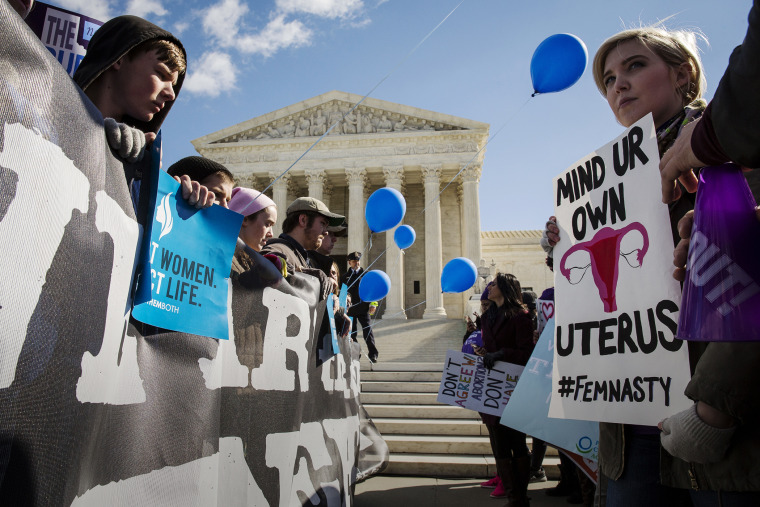Seven Democratic debates and dozens of questions into the presidential campaign, activists are calling out debate moderators for what they haven't yet done: Ask about reproductive rights.
They have signed petitions, written open letters, and appended exasperated tweets with #AskAboutAbortion. And yet — even after thousands of advocates for abortion rights rallied before the Supreme Court as it heard the most consequential abortion rights case in a generation, and not long before the court hears a case about contraceptive access — the question never came.
"We are in an absolute crisis in this country in terms of abortion access," said Ilyse Hogue, president of NARAL Pro-Choice America, which has helped lead the charge. "But it hasn't been covered at all on the Democratic side and the Republican side has been a race to the bottom."
RELATED: Supreme Court Hears Historic Abortion Case
The Republican debates have included extended colloquies about Planned Parenthood, including responses to the secretly recorded videos of abortion providers discussing the donation of fetal tissue. (Notably, Carly Fiorina described a video that didn't exist.) The candidates have debated whether any ban on abortion should include an exception for women who have been raped, and whether a woman ever needs an abortion to save her life.
In fact, at a February debate in New Hampshire, Sen. Marco Rubio himself joined the #AskAboutAbortion folks when he snapped back at a question about whether his positions on abortion and marriage for same-sex couples would alienate young voters. “There has been five Democratic debates. The media has not asked them a single question on abortion, and on abortion, the Democrats are extremists. Why doesn’t the media ask Hillary Clinton why she believes that all abortion should be legal, even on the due date of that unborn child?” he declared.
Rubio's statement about Clinton was false. Clinton supports the Supreme Court's longstanding precedent on abortion, which allows states to ban abortion after fetal viability, as long as there are exceptions for the woman's health and life. But the upshot of the silence at the debates, which arguably command the most voter attention, is that Republicans are defining the contours of the conversation.
Hogue said she's been told that reproductive rights don't make for a good primary debate question, as opposed to one in the general election, because there is little contrast between the Democrats' stances. But she believes there is an opportunity for them to offer solutions beyond positions. "Voters, the majority of whom support access to legal abortion, need to hear a plan of how the president would leverage their power to stop the assault on abortion clinics and reopen the ones that have closed," Hogue said.
In a notable departure from the status quo, both candidates have pledged to end the Hyde Amendment, the federal ban on covering abortion except in cases of rape, incest and life endangerment, and to open the door to foreign aid covering abortion overseas under those same exceptions.
RELATED: Is Texas' abortion law an undue burden on women?
Both Sanders and Clinton have also made comments that induced cringing among many reproductive rights activists. Sanders told Rolling Stone in July, "Once you get off of the social issues — abortion, gay rights, guns — and into the economic issues, there is a lot more agreement than the pundits understand," which some took to be dismissive of the economic dimensions of reproductive freedom. His health plan did not include any mention of reproductive health, despite the fact that coverage of it has repeatedly landed the Affordable Care Act in court.
A decade ago, Clinton referred to abortion as a "sad, even tragic choice to many, many women," which some advocates took as accepting the conservative narrative of abortion regret and stigmatizing the procedure. She is now far more conversant in the current reproductive rights framework, telling Fusion's Anna Holmes that the Hyde Amendment “deprives low-income women from being able to access the full range of reproductive health services.”
But there is at least some distinction between the two in NARAL's eyes: After all, the organization has endorsed Clinton, saying she has been a "champion" on their issues while Sanders has been a "super solid vote," as Hogue put it.
"We actually don’t know how much daylight there is between them," she said, "because they haven’t been asked about it in a public forum."
The next debate is March 9, a day after International Women's Day. "As long as there are debates," Hogue said, "we’re going to keep asking for the moderators to ask the question."
